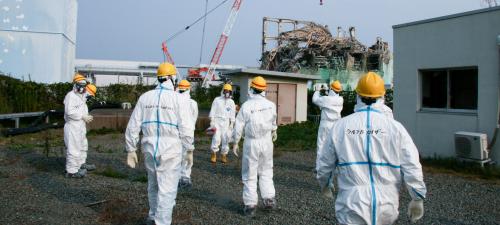UN agency ramps up effort to counter growing nuclear threat from cyberspace
As part of its efforts to strengthen nuclear security worldwide, the International Atomic Energy Agency (IAEA), announced on Wednesday that it has developed a training programme designed to protect facilities from the growing threat of cyber-attacks.

IAEA International Remediation Expert Mission examines Reactor Unit 3 during a visit to TEPCO’s Fukushima Daiichi Nuclear Power plant.
The programme kicked off in October with a course entitled “Protecting Computer-Based Systems in Nuclear Security Regimes,” which brought together 37 participants from 13 countries for two weeks of immersive training on best practices in computer security.
The IAEA is the world's central intergovernmental forum for scientific and technical co-operation in the nuclear field.
The new course, developed together with the US Department of Energy’s National Nuclear Security Administration (NNSA) and hosted by the Idaho National Laboratory, is the first in a series of IAEA information and computer security courses focusing on raising awareness of the threat posed by cyber-attacks, and their potential impact on nuclear facilities around the world.
Participants tested their skills on mock-ups that accurately replicate state-of-the-art digital systems common in the control rooms, where digital technologies provide functions that support safe operations, security, and the protection of sensitive information.
“Everyone with responsibility for nuclear security must have a thorough understanding of the vulnerabilities of their systems,” said Raja Adnan, Director of the IAEA’s Division of Nuclear Security, adding that “they must know how to prevent and mitigate possible cyber-attacks on those systems.”
In June, IAEA Director-General Yukiya Amano warned a Paris conference on the use of digital technology in the nuclear industry, that instrumentation and control systems in nuclear power plants could be subject to cyber-attacks, with potentially serious consequences.
He urged the nuclear industry and national regulators to build up the data and experience needed to ensure that new systems meet all reliability and performance requirements.
The IAEA, which is headquartered in the Austrian capital, Vienna, works for the safe, secure and peaceful uses of nuclear science and technology, contributing to international peace and security and the United Nations' Sustainable Development Goals.
Source:United Nations
- 364 reads
Human Rights
Fostering a More Humane World: The 28th Eurasian Economic Summi

Conscience, Hope, and Action: Keys to Global Peace and Sustainability

Ringing FOWPAL’s Peace Bell for the World:Nobel Peace Prize Laureates’ Visions and Actions

Protecting the World’s Cultural Diversity for a Sustainable Future

Puppet Show I International Friendship Day 2020

